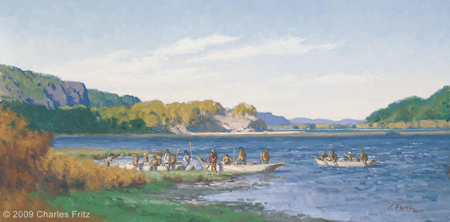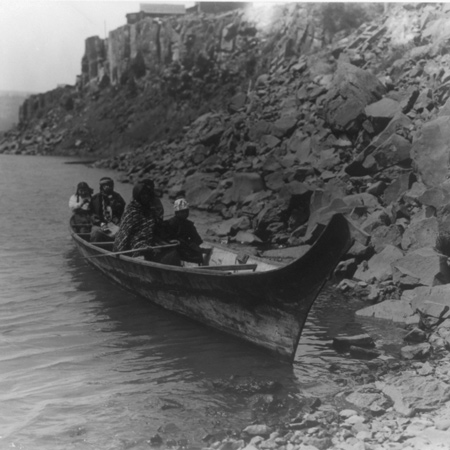The expedition sets out from Fort Rock but is soon stopped by Columbia River headwinds at present Crates Point below The Dalles, Oregon. The captains visit nearby Chilluckittequaws, and Lewis takes a vocabulary of the Upper Chinookan language. Clark sees goods acquired from British trade ships and comments on the superiority of Chinookan canoes.
Cooking in Baskets
by Yellowstone Public Radio[1]Originally aired weekdays by Yellowstone Public Radio during the Bicentennial observance of 2003-2006. Narrated by Hal Hansen. Scripts by Whit Hansen and Ed Jacobson. Produced by Leni Holliman. © … Continue reading
Headwinds on the Columbia
10″ x 20″ oil on board
© 2009 by Charles Fritz. Used by permission.
Columbia River Headwinds
the wind rose So high N W that obledged us to halt on the Lard. Side under Some clifts of rocks. the Indians came in their canoes to our camps.
—John Ordway
The Chilluckittequaw People
Those people call themselves Chil-luckit-te-quaw [Chilluckittequaw], live in houses Similar to those described, Speake Somewhat different language with maney words the Same & understand those in their neighbourhood Cap Lewis took a vocabilary of this Language
—William Clark
British Trade Goods
I entered one of the houses in which I Saw a British musket, a cutlash and Several brass Tea kittles
Saw them boiling fish in baskets with Stones
—William Clark
On the Columbia—Wishham (c. 1910)
Edward S. Curtis (1868–1952)
U.S. Library of Congress Prints and Photographs Division, LOT 12326-A
Superior Chinookan Canoes
The wind which is the cause of our delay, does not retard the motions of those people at all, as their canoes are calculated to ride the highest waves, they are built of white cedar or Pine verry light wide in the middle and tapers at each end, with aperns, and heads of animals carved on the bow, which is generally raised.
—William Clark
Weather Diary
Day of the month Wind State of the Weather 28th N W. rain after fair a Violent wind a moderate rain commenced at 4 oClock P. M. and continued untill 8 P. M.
—William Clark[2]Some abbreviations have been spelled out.
Experience the Lewis and Clark Trail
The Lewis and Clark Trail Experience—our sister site at lewisandclark.travel—connects the world to people and places on the Lewis and Clark Trail.
Plan a trip related to October 28, 1805:

Rock Fort Campsite is a High Potential Historic Site along the Lewis and Clark National Historic Trail managed by the U.S. National Park Service. The site owned by Wasco County, Oregon, and is open to the public.
Notes
| ↑1 | Originally aired weekdays by Yellowstone Public Radio during the Bicentennial observance of 2003-2006. Narrated by Hal Hansen. Scripts by Whit Hansen and Ed Jacobson. Produced by Leni Holliman. © 2003 by Yellowstone Public Radio. |
|---|---|
| ↑2 | Some abbreviations have been spelled out. |




